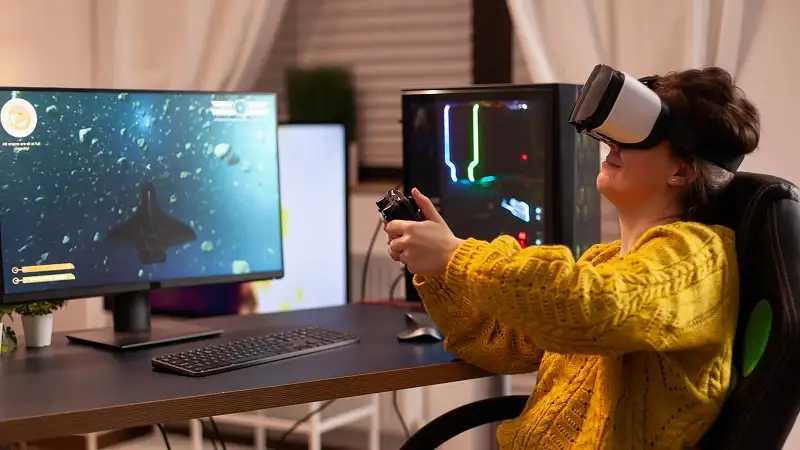In today’s fast-paced digital landscape, gaming has become more than just a form of entertainment—it is a billion-dollar industry, a cultural movement, and a technological frontier. One of the most exciting developments in this space is the emergence of Games ProgramGeeks, a term that encapsulates the fusion of game development and a tech-savvy, enthusiastic community that pushes the boundaries of what games can do. In this article, we will explore what games programgeeks means, its origins, its impact on the gaming industry, and the future it holds.
The Rise of Games ProgramGeeks
The concept of Games ProgramGeeks originated from the intersection of passionate programmers and innovative game designers. Unlike casual gamers or even professional developers in large studios, programgeeks are individuals or small teams that live and breathe code, gaming mechanics, and software architecture. Their contributions go beyond playing or even developing games—they are the ones building engines, modifying games (modding), and crafting entirely new experiences from scratch.
With the increasing accessibility of game development tools like Unity, Unreal Engine, and Godot, more individuals are able to become part of the Games ProgramGeeks movement. These platforms have democratized game creation, allowing both beginners and experts to experiment and innovate.
Core Characteristics of Games ProgramGeeks
To understand the value brought by this community, it’s essential to examine the defining traits of games programgeeks:
1. Technical Mastery
Games programgeeks are not just gamers—they are often full-stack developers, software engineers, or coding hobbyists with an in-depth understanding of C++, Python, C#, and more. They know how to manipulate graphics engines, physics engines, and back-end architectures to bring their visions to life.
2. Passion for Innovation
These individuals are constantly seeking new ways to enhance gaming. Whether it’s through AI-driven NPCs, dynamic world generation, or real-time ray tracing, games programgeeks thrive on the bleeding edge of technology.
3. Open Source Contribution
Many in this community contribute to open-source projects, releasing tools, game engines, or full games under open licenses. This collaborative spirit allows innovation to thrive and evolve rapidly.
4. Community Engagement
Games programgeeks actively participate in forums like Stack Overflow, GitHub, and Reddit communities. They collaborate, troubleshoot, and share knowledge, helping to uplift the entire industry.
Influential Projects by Games ProgramGeeks
There have been countless notable projects developed by or inspired by this community. Here are a few that have significantly impacted the gaming world:
1. Dwarf Fortress
Created by Tarn and Zach Adams, Dwarf Fortress is a prime example of a game developed by programgeeks. Despite its ASCII graphics and steep learning curve, the game’s deep simulation and emergent storytelling have earned it a cult following. It is a technical marvel that simulates an entire world down to the bodily systems of its inhabitants.
2. OpenTTD
OpenTTD is an open-source remake of the classic game Transport Tycoon Deluxe. Developed by community contributors, it adds new features, modern graphics, and multiplayer capabilities while maintaining the charm of the original.
3. Godot Engine
The Godot Engine was developed as a free, open-source game engine that rivals even commercial engines. Its intuitive scripting language, GDScript, and node-based architecture have made it a favorite among indie developers and games programgeeks.
4. Minecraft Mods
The modding community around Minecraft is another testament to the power of programgeeks. From gameplay overhauls to graphical enhancements and new mechanics, these mods have kept the game fresh and engaging for over a decade.
The Educational Impact of Games ProgramGeeks
One of the most overlooked contributions of this community is in the realm of education. Many games programgeeks run YouTube channels, Twitch streams, and blogs to teach others about game development. Tutorials on pathfinding algorithms, shader development, and AI behavior trees are freely available thanks to this community.
Some popular educational platforms and personalities include:
-
Brackeys (though retired, the channel remains a treasure trove of Unity tutorials)
-
The Cherno (offers in-depth tutorials on C++ and engine development)
-
Sebastian Lague (focuses on game-related algorithms and creative simulations)
Universities have also started to integrate more game-focused programming courses in their curriculum, often inspired by or directly referencing the work done by independent games programgeeks.
The Business of Games ProgramGeeks
Though many games programgeeks start off as hobbyists, their skills are increasingly being monetized. Indie game development has become a legitimate career path, with platforms like Steam, Itch.io, and the Epic Games Store providing distribution channels for small teams or even solo developers.
Some programgeeks have successfully turned their passion into profitable ventures:
-
ConcernedApe, the solo developer of Stardew Valley, famously created the entire game over four years and has sold millions of copies.
-
Eric Barone demonstrated that a single individual with programming knowledge and a love for games can make a global impact.
Furthermore, with the rise of blockchain and NFTs in gaming, many programgeeks are exploring decentralized platforms to create player-owned economies and interoperable game assets.
Challenges Faced by Games ProgramGeeks
Despite their passion and skill, games programgeeks also face significant challenges:
1. Burnout
Creating games is a time-consuming and mentally demanding task. Many developers face burnout, especially when working alone or with limited resources.
2. Discoverability
With thousands of games released each month, standing out in the crowded indie market is difficult. Marketing is not a strong suit for many technically inclined developers.
3. Funding
Accessing funding without compromising creative control is a major concern. While crowdfunding has opened new doors, it comes with its own pressures and expectations.
The Role of AI and Emerging Tech
The future of games programgeeks is intertwined with emerging technologies. Artificial Intelligence, machine learning, and procedural content generation are redefining the scope of what games can do.
-
AI NPCs: Characters that learn from player behavior can provide more dynamic and personalized experiences.
-
Neural Level Design: AI can generate levels based on player feedback or desired difficulty curves.
-
Cloud-Based Development: Services like Unity Cloud and GitHub Codespaces are making it easier for distributed teams to collaborate on game projects.
Programgeeks are at the forefront of integrating these tools into their workflows, further pushing the envelope of what’s possible in game development.
Games ProgramGeeks in the Broader Gaming Culture
The influence of games programgeeks extends beyond just development—they also shape the broader culture of gaming. Events like game jams (e.g., Ludum Dare, Global Game Jam) showcase rapid, creative prototypes from indie developers and hobbyists.
Online forums and platforms dedicated to game dev culture have become hotbeds of creativity. On Reddit, subreddits like r/gamedev and r/IndieDev are packed with discussions, tutorials, and showcases.
Furthermore, many gamers now seek titles developed by programgeeks specifically for their innovation, challenge, and unique perspectives—something often missing in large, commercially driven studio releases.
The Future of Games ProgramGeeks
The future is bright for games programgeeks. As tools become more accessible and distribution channels more democratized, the opportunities for innovation are virtually limitless.
Key trends likely to define the future include:
-
Metaverse Development: Creating interconnected game worlds with persistent user identities and assets.
-
Cross-Platform Engines: New engines that allow seamless development for mobile, PC, and console.
-
Ethical Gaming: Developers focusing on mental health, inclusivity, and educational value in their games.
The games programgeeks community will continue to lead this charge, as they are often the first to embrace and experiment with new ideas.
Conclusion
Games ProgramGeeks are not just coders—they are visionaries, educators, entrepreneurs, and artists. They are the backbone of indie development, the lifeblood of innovation, and the champions of technical excellence in gaming. Their contributions have shaped the industry in profound ways and will continue to do so as technology evolves.
Whether you’re a gamer, a developer, or simply someone interested in the future of interactive entertainment, the world of games programgeeks is one worth exploring. As this vibrant community continues to grow, it promises to redefine what games can be—and what they can mean to the world.

